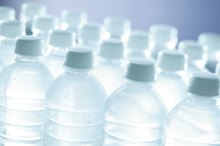What does fact checked mean?
At Healthfully, we strive to deliver objective content that is accurate and up-to-date. Our team periodically reviews articles in order to ensure content quality. The sources cited below consist of evidence from peer-reviewed journals, prominent medical organizations, academic associations, and government data.
The information contained on this site is for informational purposes only, and should not be used as a substitute for the advice of a professional health care provider. Please check with the appropriate physician regarding health questions and concerns. Although we strive to deliver accurate and up-to-date information, no guarantee to that effect is made.
Lipton Decaffeinated Tea Nutrition
Lipton, a brand of tea owned by Unilever, sells black, white, green and flavored teas. Some of the teas have been decaffeinated, which makes them healthy options for individuals trying to limit their caffeine consumption. Although the nutrition facts may vary slightly depending on the specific tea, most Lipton decaffeinated teas offer nutrients that are quite similar.
Nutrition Facts
Lipton decaffeinated black tea does not contain any calories, sodium, carbohydrates or protein. The decaffeinated black tea provides 20 mg of potassium, while the decaffeinated green tea provides 15 mg and the decaffeinated honey lemon green tea only 10 mg of potassium. The serving size for each type of decaffeinated tea is one tea bag.
Flavonoids
Chai Tea Latte Health Benefits
Learn More
Although research is ongoing, consuming foods and beverages containing flavonoids may provide a number of health benefits. Possible benefits include the prevention of blood clots, the suppression of tumor growth and the provision of anti-inflammatory properties, according to "The New York Times." The Lipton decaffeinated tea that contains the fewest flavonoids is the honey lemon green tea 1. Each tea bag of this flavor contains 70 mg of flavonoids. Lipton decaffeinated black tea has 105 mg of flavonoids per serving. The decaffeinated green tea contains the most flavonoids, providing 130 mg per serving.
- Although research is ongoing, consuming foods and beverages containing flavonoids may provide a number of health benefits.
- The decaffeinated green tea contains the most flavonoids, providing 130 mg per serving.
Caffeine
Even decaffeinated teas contain trace amounts of caffeine. Lipton decaffeinated green tea and decaffeinated honey lemon green tea both contain 4 mg of caffeine per serving. The decaffeinated black tea contains 5 mg of caffeine per serving. In comparison, the average cup of caffeinated green tea provides between 20 and 35 mg of caffeine, while Lipton's caffeinated black tea has 55 mg of caffeine per serving.
- Even decaffeinated teas contain trace amounts of caffeine.
- Lipton decaffeinated green tea and decaffeinated honey lemon green tea both contain 4 mg of caffeine per serving.
Considerations
Decaf Black Tea & Pregnancy
Learn More
Although decaffeinated tea is a healthful beverage, adding additional ingredients can significantly alter the nutrients -- and not in a good way. While adding milk to tea can provide some calcium, it can also add calories and fat. Adding sugar or other flavoring typically increases the overall calorie content of the beverage without providing any nutritional benefit. Always check the nutrition label of the item you’d like to add to the tea to get an accurate idea of how doing so may alter the calories and nutrients of your beverage.
- Although decaffeinated tea is a healthful beverage, adding additional ingredients can significantly alter the nutrients -- and not in a good way.
Related Articles
References
Writer Bio
Elizabeth Wolfenden has been a professional freelance writer since 2005 with articles published on a variety of blogs and websites. She specializes in the areas of nutrition, health, psychology, mental health and education. Wolfenden holds a bachelor's degree in elementary education and a master's degree in counseling from Oakland University.









